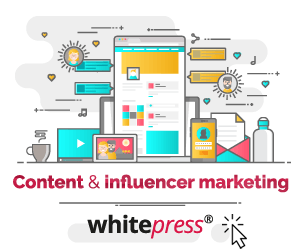Nowadays, plenty of content is getting shared but without actual links to the original source. In general, getting mentioned by someone else is great news, but it won’t help your website that much in terms of SEO. That’s when link building becomes useful. At first, it may not be that easy to get quality backlinks to your web pages, but you can easily get started with sponsored content. And here’s why link building through sponsored content is a great way to influence your SEO efforts.
What is link building?
The aim of link building is to get featured on other websites with a backlink to your own webpage. It may not sound like much, but link building is important and still effective. Links not only help the users to navigate between web pages in search of relevant content but are also used by the search engines to discover new websites and decide how well should they rank in their result pages.
The more visible your site is, the better for your business – and link building can help you achieve exactly that. Don’t forget that the Internet is full of content, even more so with increased content marketing and SEO efforts. It may happen that you don’t know where to look for reliable information anymore, and your target group surely feels the same. That’s why having a well-designed website and creating a lot of content makes very little sense if you don’t promote it properly – simple because no one may ever find out about it. Link building can help you change that.

What are link building strategies?
There are different techniques when it comes to link building. You should always try different approaches before you find the one that works best for you. Especially since for many SEO experts link building is one of the most difficult and time-consuming parts of their day-to-day work. Don’t feel discouraged, though – it means that once you’re successful with your link building activities, you can easily overtake your competitors.
Here’s how to take advantage of different link building strategies:
- Start with internal links that refer from one subpage to another within your website. Although often overlooked, internal links are a perfect way to start your journey with link building. They help your website visitors to dig deeper when it comes to your content (and thus, your products or services). Actually, the improve your page authority and help to decrease bounce rates.
- Create valuable, quality content that people may simply feel inspired enough to link to on their blogs, websites or social media profiles. If you optimize an interesting piece of content well, you can get in front of people who care about its topic. The more people see it, the better. The aim should be to ultimately reach influencers and relevant, popular sources, and encourage them to provide backlinks to your content.
- Use content curation and social sharing sites. Content curation sites, such as BuzzFeed or Scoopt.it, allow users to pick their favorite topic to browse and share any content they find linkable within their social networks. Social bookmarking sites, on the other hand, lets you add, edit and share your content with a wider audience, with backlinks to your websites. Medium and Reddit can easily get you started.
- Invest in sponsored content – pay for well-written articles, blog posts or reviews instead of regular ads. Creating valuable content is one thing, but having it published with a backlink to your website is a different story. Sponsored content lets you have both. Plus, if done well, it has a positive influence on your authority and exposure.

Sponsored content – is it worth the effort?
Definitely. As mentioned before, even creating quality content may not get you places at times, especially if you’ve just started your link building efforts. On the contrary, sponsored articles can help you get noticed more easily, especially at the very beginning.
With that much content being published every day, brands often turn to native advertising to promote their pieces. Native ads are quite an interesting option since they seem cohesive with the page content in terms of design, topic, and tone of voice. At first, they may not even resemble ads. As one of the ad units, sponsored articles provide a very good example of such advertising. It’s quite a unique way to promote your products or services. You’re being associated with a proper publication that can build your image as an expert, increase brand awareness and drive quality traffic to your website, rather than with aggressive ads and banners popping up all of a sudden, usually out of nowhere.
Interestingly enough, sponsored guest posts are sometimes perceived as risky. There are many misconceptions around them, which are not always justified.
What are sponsored guest post and how can you benefit from them?
When discussing sponsored guest posts, what’s meant is any type of posts which were paid for in order to be published. Basically, you pay some external site to be featured among its contributors.
The issue is that “buying links to manipulate the search engine rankings” is forbidden, and can even be penalized by Google. Back in the day, quantity mattered much more than quality, and so-called Black Hat SEO was extremely popular. Nowadays, however, Google tries to prevent such activities and pays attention to the quality of sources with a lot of hyperlinks. Still, if you’re not trying to go against Google’s policy but to provide relevant content, sponsored guest posts and articles will be perfectly acceptable and you won’t get penalized.
What often makes a difference and resolves all doubts about the potential “shadiness” of such content is to mark paid guest posts as sponsored. If it’s clear to see whether someone paid for the post, it’s not controversial anymore. This fact is often mentioned by the authors themselves or indicated by the publisher. As an author, you simply owe it both to Google and your readers.
What’s in it for your brand? You will surely get more mentions (assuming that you throw its name a few times in the article and the author’s bio), and sometimes it may even be enough to increase domain authority. In fact, Google perceives un-linked brand mentions similarly to actual hyperlinks – minus the risk of being cheated the author.
Apart from actual mentions, you have a chance to increase your visibility and broaden your audience. Especially if your post is featured on a reputable source, which automatically means that is good enough to be posted there and thus, is held in higher regard – along with its author. Maybe your website won’t be linked, but if the text is good, it will surely be remembered by the readers. Depending on the popularity of the source, you should get a proper exposure. Just in case, pay attention not only to the quality of the source but also to its target group. It makes much more sense to reach the audience that can be interested not only in the articles you write but also products or services you provide.
More importantly, however, increased brand awareness should drive more direct traffic to your website. And the more popular your web page is, the better for your business. It may not affect your rank in search engines per se, but definitely gain more visibility and more traffic. It all depends on your goals and your budget. Paid guest posts alone may not be the most effective link building technique, but if the price of publishing on a quality blog that targets your preferred audience is not excessive, you should definitely go for it. Still – aim at traditional guest posting first, and if it’s not possible, turn to paid opportunities.

What to look at when you want to publish a sponsored article or a blog post?
If you are browsing paid opportunities to publish an article or a blog post, always pay attention to the sources that give such a possibility. There are a few questions you can ask yourself before you proceed:
- How popular is the website? (You can check the numbers on social media, as well as monthly website traffic, domain authority, user time on page, and how high it ranks in Search Engine Results Page),
- How long can my article be?
- Are links to my website going to be provided or not? If so, how many?
- How much time does it take to get published on this site?
- How much time will the article stay live on the site?
- Are there any additional forms or promotion available (for example, your article can be further promoted on social media, included in newsletters, and so on)?
It’s always recommended to find at least a few sources that accept guest posts first, and then compare their offers and see what’s best for you. Although researching such sources may seem difficult – you can take advantage of the specific networks and platforms for sponsored articles available. Here’s a useful list to get you started.

Finding paid opportunities – networks and platforms for sponsored articles and blog posts
- Whitepress.net
- Blogsvertise.com
- Linkhouse.co
- Buysellads.com
- Syndicateads.net
These tools can help you find trusted sites to get featured on. Why is it important? There are many web pages that are actually full of spam, and most likely won’t attract the right audience (or any audience, for that matter). That’s not the only issue, though. By posting on such sites with a backlink to yours, you can get penalized by Google.
In that case, link building makes no sense – it should help to increase traffic, domain authority and your position on the Search Engine Results Page, rather than decrease it. That’s why building links is only right when you publish on trusted, quality websites – and thanks to proper tools and networks, you can now find them easily. Through some of the above-mentioned platforms, you can even buy an article and then explore paid guest posting opportunities, so there’s no need to write anything yourself. Still, it’s better to at least have a content strategy, which such articles could become part of.
Since link building gained momentum, more and more ways to build links are available. Make sure you always focus on quality versus quantity, though. Getting your content published on the right sites should matter more than on a lot of sites – and building links through sponsored content allows you to be pickier when choosing a publisher.









